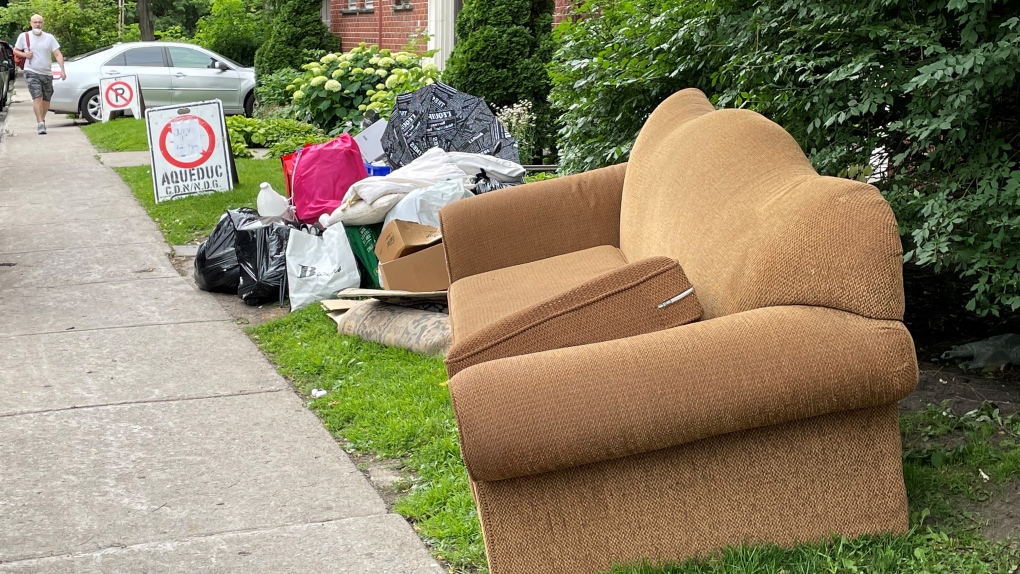Bed bug basics: How to prevent them, how to find them, and what to do if you have them
Summer is moving season in Montreal. It's also the season when the most unwanted of roommates -- bed bugs -- are at their peak.
Don Prashker is the owner of Thermapro Solutions, a Montreal company that specializes in bed bug extermination.
He shared a few tips to keep in mind this summer, whether you're trying to avoid bed bugs or already have them in your space.
LEAVE CURBED FURNITURE ON THE CURB
According to Prashker, the easiest way to deal with bed bugs is to prevent them from entering your home in the first place.
The insects are particularly common in apartment buildings as they can easily migrate from one unit to the next -- but they can also hitchhike from faraway places.
One common mode of transportation is used furniture, which can be a major gamble when it comes to bugs, especially when that furniture is picked up on the side of the road.
 Moving day in Montreal means piles of furniture and other discarded items along the streets. (Touria Izri/CTV News)
Moving day in Montreal means piles of furniture and other discarded items along the streets. (Touria Izri/CTV News)
"There's a lot of furniture being left out on curbsides and on corners," he said. "People are literally collecting that, bringing that into their own home, and this is a great way to get bedbugs."
THE TRUTH IS IN THE POOP
But what about the furniture you already own -- how can you tell if there's an issue?
"Bed bugs always leave their calling cards, and that's their poop," says Prashker.
"They're black little dots, like someone took a toothbrush, dipped it in ink, and kind of spritzed it on the mattress."
 (File image)
(File image)
These speckles will often appear on the seams of the mattress or even on bedsheets.
When you move into a new place, search for these telltale stains around baseboards and electrical outlets, as their presence could indicate an infestation that's been around for a while.
Bugs sometimes relocate to these areas after the furniture has been sprayed with over-the-counter treatments, Prashker explains.
DITCH THE DIY METHODS
Speaking of which, Prashker says do-it-yourself treatments should be avoided if possible.
He says the trick to getting rid of bed bugs is by baiting them, not repelling them, which is why he recommends professional heat treatments over common chemicals.
"Please be careful when using over-the-counter products," he said. "They tend to be repellents, and you don't want to repel bed bugs. That's just pushing the problem from one unit to the next."
Instead, he recommends hiring professionals who can pump heat into the rooms and "literally cook" its contents, killing the bugs.
"Bed bugs are instinctively attracted to heat, so they come towards the heat treatment," he explains. "We just continue to crank up the heat everywhere until it's universal, and there's nowhere for the bed bugs to go."
When moving to a new place, he says tenants should keep an eye out for signs of treatments past.
"If you see any pesticides or residuals or traps, these are good signs to ask the landlord what was going on."
ACT FAST
Take action soon as you spot the signs, Prashker advises.
"The earlier you get on top of a bed bug problem, the easier it is to solve," he says. "It's a lot easier to kill five of them than it is to kill 5,000 of them."
If you don't address it right away?
"Within three months, you'll have an infestation. Within six months you'll have more eggs than you do bugs."
BUST THE STIGMA
The biggest way to prevent the spread of bed bugs is by addressing the shame that comes with them, according to Prashker.
"There's a huge psychological stigma to this problem," even though bed bugs don't necessarily indicate a lack of hygiene or a dirty home.
He says reluctance to openly discuss the issue hinders the implementation of protocols that could slow the spread.
When a child has lice, for example, school administration sends out a letter to parents informing them -- but these same measures don't exist for bed bugs.
"So kids are coming to school when they have bed bugs at home, and three more kids are now bringing them home as well."
--With files from CTV's Touria Izri
CTVNews.ca Top Stories

4th Indian national arrested, charged with murder of Hardeep Singh Nijjar
Homicide investigators in B.C. say murder charges have been laid against a fourth Indian national in connection to the killing of Sikh activist Hardeep Singh Nijjar outside a Surrey gurdwara last year.
'I am angry': Alberta farmers will continue fight over world class motorsport resort
The rolling hills leading to the hamlet of Rosebud are dotted with sprawling farms and cattle pastures -- and a sign sporting a simple message: No Race Track.
Man ticketed after allegedly trespassing again at Drake's Bridle Path mansion to get his bike
A man who tried to access Drake’s Bridle Path mansion earlier this week returned to the property Saturday and was apprehended again for allegedly trespassing, Toronto police say.
Couple randomly attacked, 1 stabbed, by group of teens in Toronto, police say
A man has been transported to hospital after police say he was stabbed in a random attack carried out by a group of teens in Toronto on Friday night.
Millions of Canadians have been exposed to potentially toxic chemicals, and they're not going anywhere
For decades, North Bay, Ontario's water supply has harboured chemicals associated with liver and developmental issues, cancer and complications with pregnancy. It's far from the only city with that problem.
Biden calls Trump 'unhinged,' says 'something snapped' in former president after he lost 2020 U.S. election
U.S. President Joe Biden on Saturday called Donald Trump “clearly unhinged” and claimed that “something snapped” in the former president after he lost the 2020 election.
Wildfire that forced evacuation of Fort Nelson, B.C., caused by tree falling on wires, mayor says
The wildfire that prompted the evacuation of more than 3,000 people near Fort Nelson, B.C., was caused by a tree falling on wires, according to the municipality's mayor.
Switzerland's Nemo wins 68th Eurovision Song Contest
Swiss singer Nemo won the 68th Eurovision Song Contest on Saturday night with 'The Code,' an operatic ode to the singer’s journey toward embracing their nongender identity.
IN PICTURES Northern lights dance across the night sky in southern Ont.
From London, to Grand Bend, Collingwood and Guelph, here are some highlights of Friday night and Saturday morning's northern lights display.
































